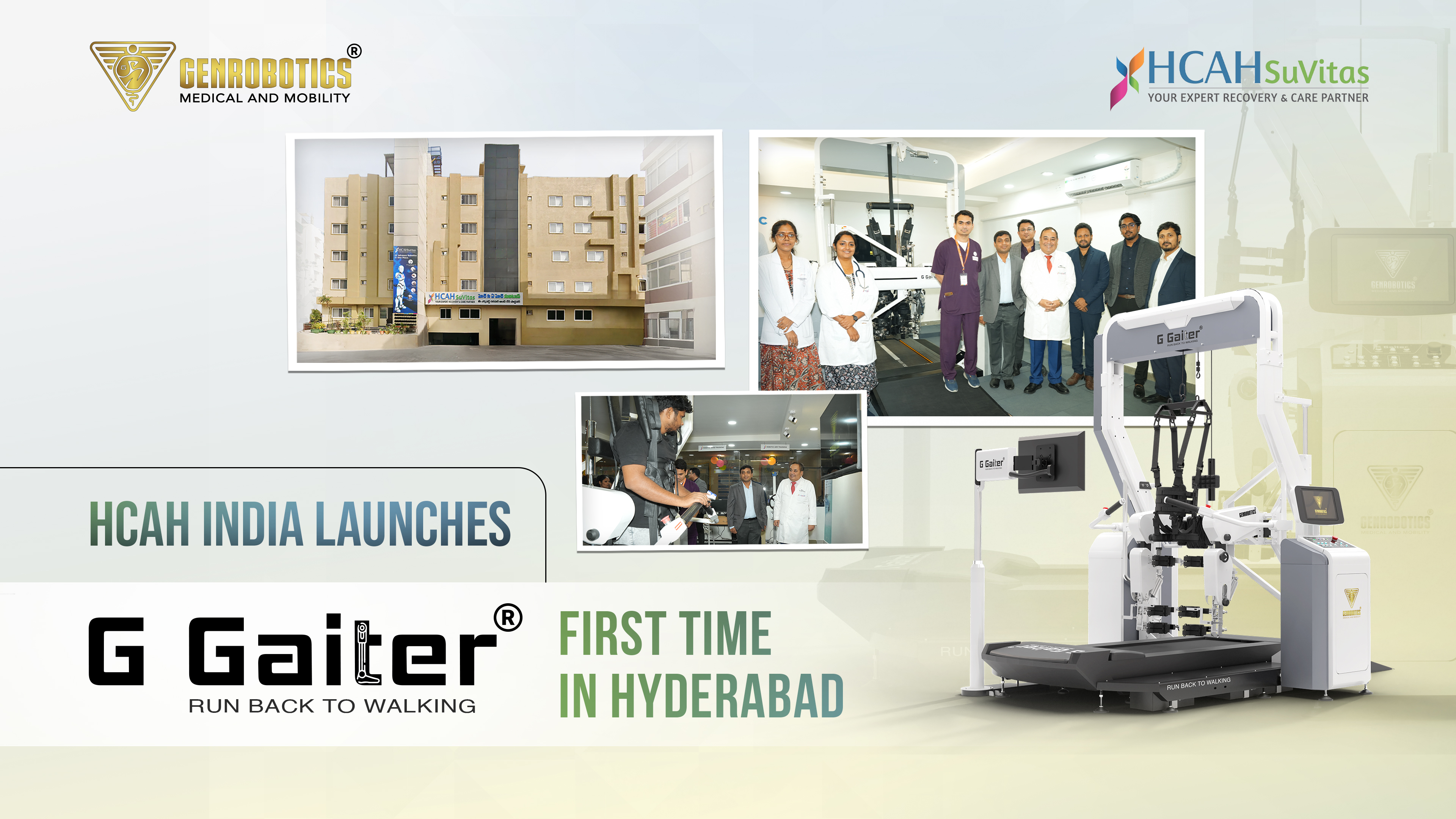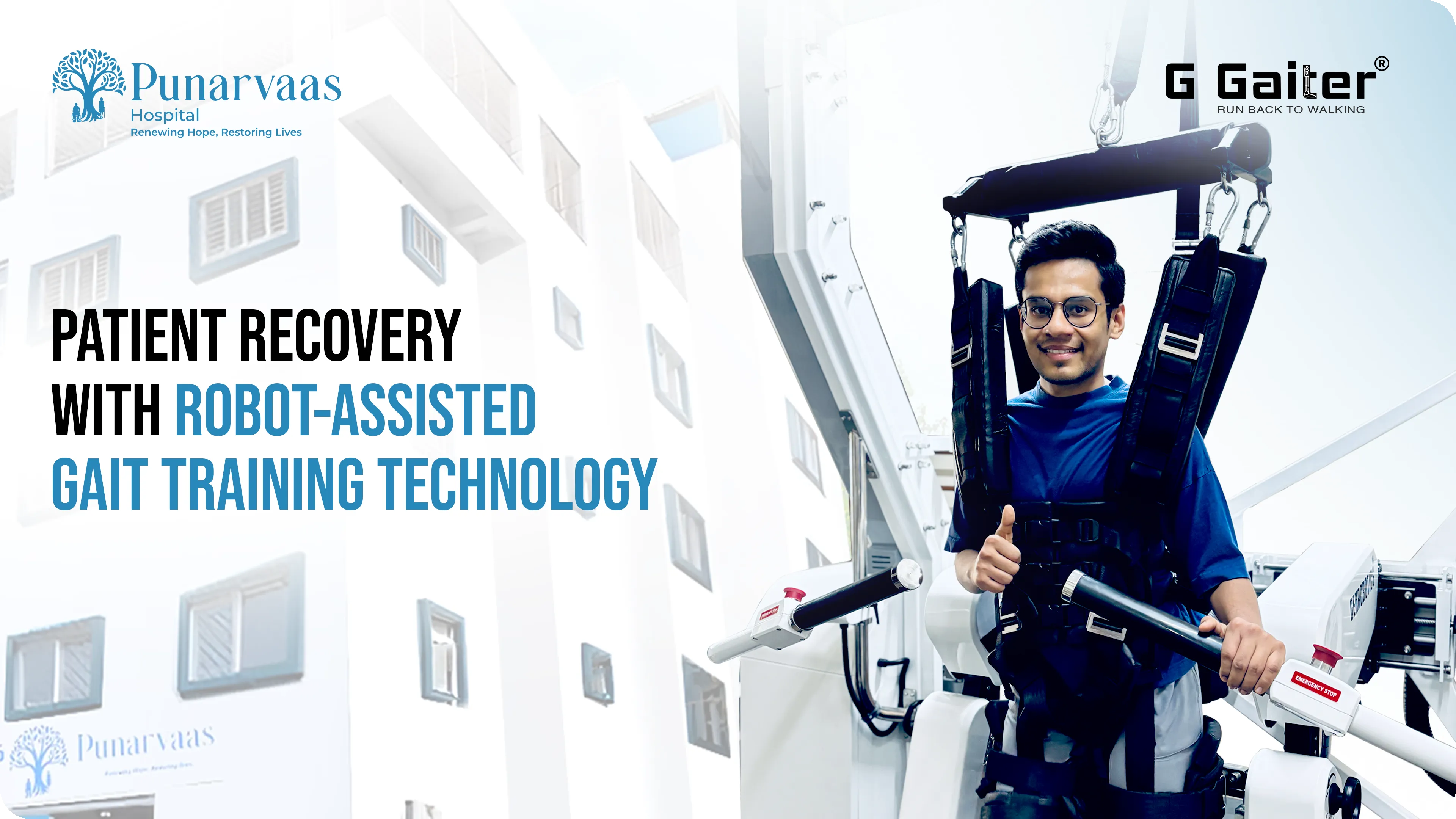

HCAH SuVitas Rehabilitation Centre has launched the advanced robotic gait trainer G Gaiter for the first time in Hyderabad during the inauguration of the Center for Advance Robotics & Recovery on World Stroke Day. In collaboration with Genrobotics Medical & Mobility, this launch introduces AI-driven robotic gait rehabilitation to support patients recovering from stroke, spinal cord injury, and other mobility impairments.
.jpg)
On World Stroke Day, the story from General Hospital Thiruvananthapuram highlights how robotic-assisted gait training with the G Gaiter is helping stroke survivors regain mobility and confidence. Through structured rehabilitation guided by the hospital’s Physical Medicine and Rehabilitation team, patients are showing significant improvement. The integration of advanced robotic technology is enhancing outcomes and reducing therapist workload.

Shubhram, recovering from Guillain-Barré Syndrome, faced severe weakness that made basic daily activities difficult. Through consistent robot-assisted gait training and guidance from the therapists at Punarvaas, he gradually rebuilt strength, improved balance, and relearned proper walking patterns. This safe, precise, and engaging therapy boosted his independence, confidence, and overall mobility in just two months.
.jpg)
On February 2, 2025, India’s First Paediatric Robotic Gait Trainer, G Gaiter Paediatric, was launched at the Iqraa - Thanal Super Specialty Early Intervention Center in Kozhikode. G Gaiter Paediatric aims to enhance paediatric rehabilitation for those with mobility impairments by offering a more precise and effective approach to gait training.
.jpg)
On January 3, 2025, Genrobotics introduced India's First Paediatric Robotic Gait Trainer, the G-Gaiter Paediatric, at the C-DAC auditorium in Technopark, Thiruvananthapuram. The G-Gaiter Paediatric was inaugurated by Smt. Veena George, Hon’ble Minister for Health, Women, and Child Development, Government of Kerala, alongside other distinguished chief guests. The launch marked a milestone in paediatric rehabilitation.

Robotic gait trainers help SCI patients regain mobility, improve motor function, and enhance rehabilitation. By preventing complications and promoting independence, these technologies transform recovery and improve quality of life. Integrated into therapy, they offer personalized support, stimulating neural pathways for better outcomes. Hospitals are adopting these tools to revolutionize spinal cord injury rehabilitation.
.jpg)
Stroke rehabilitation can be long and challenging, but robotic technology is changing the landscape. Innovations like Genrobotics G-Gaiter provide advanced, personalized gait training that promotes neuroplasticity and enhances mobility, motivation, and recovery. The G-Gaiter enables patients to regain independence and confidence on their recovery journey, setting a new standard for effective stroke care.

Dr. Nitha from KIMSHEALTH emphasizes the critical role of rehabilitation in helping patients regain mobility after strokes and serious injuries. She highlights the importance of a collaborative approach, involving robotics and advanced technologies like the G Gaiter. Dr. Nitha advocates for integrating these innovative solutions into rehabilitation to enhance patient outcomes, showcasing the growing awareness of advanced treatment options in the healthcare field.

Physiotherapists find advanced robotic systems like the G Gaiter enhance gait training by making it more personalized and efficient. These innovations improve patient outcomes, reduce therapist workload, and provide real-time data insights, streamlining rehabilitation for better care. The future of physiotherapy is being reshaped by advanced robotics.

G-PLOT exoskeleton technology delivers precise gait training with its patented pneumatic system and AI integration. It ensures patient comfort and affordability with smooth, silent operation and minimal maintenance. Adjustable support for hip and knee joints offers superior comfort and dynamic support, setting a new standard in gait rehabilitation.

Arun's rehabilitation at Aster Mother Hospital, supported by the G Gaiter robotic gait trainer, transformed his mobility. In just three months, he progressed from struggling with balance to walking independently, demonstrating the effectiveness of advanced rehab technology and determination. His inspiring journey highlights the power of resilience, high-quality medical care, and the potential for recovery against the odds. Arun's story is a beacon of hope for those facing similar challenges.

Amrita Hospital and KIMSHEALTH are at the forefront of rehabilitation innovation with G Gaiter, a state-of-the-art robotic gait trainer that revolutionizes Physical Medicine and Rehabilitation (PM&R) practices. This advanced technology not only improves patient outcomes but also supports inclusive healthcare solutions, ensuring quality rehabilitation is accessible to all patients.

Innovations are the backbone of progress. Progress lies when every living being of the nation receives a good quality of life. On this National Technology Day, let's reflect on the profound social impact of technology in improving the lives of those in need. From individuals recovering from health conditions to those seeking rehabilitation, technology has become a beacon of hope, offering innovative solutions to enhance their quality of life.

Parkinson's disease exacts a heavy toll, gradually affecting the nervous system and disrupting motor control. From mild weakness to debilitating mobility issues, individuals with Parkinsonism face a spectrum of challenges. More than 1 million cases occur per year in India alone. According to World Health Organization (WHO), The prevalence of Parkinson’s Disease has doubled in the past 25 years.